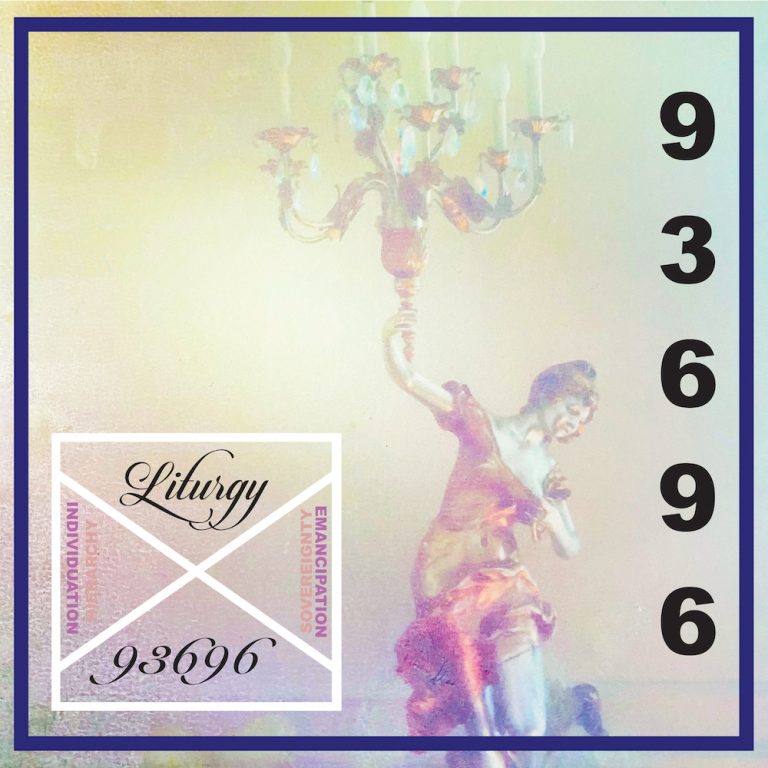The title of Liturgy’s sixth studio album is a translation of ‘heaven’ via Thelemic numerological interpretation. Thelema, founded by Aleister Crowley in the early 1900s, is a social, spiritual, and occult philosophy that’s underpinned by the concept of will/desire. Yet this is more than just a concept record, this is a way of life for the band’s songwriter Haela Ravenna Hunt-Hendrix. There’s a return to the concept of haelegen here, Hunt-Hendrix’s own interpretation of heaven, which was first addressed on 2015’s perplexing (at the time, but it’s content now makes more sense given subsequent output) The Ark Work, and there are a whole bunch of online videos with Hunt-Hendrix explaining such things. They’re intense, but worth checking out if that’s your bag.
There are four distinct movements on 93696, each corresponding with Hunt-Hendrix’s own interpretation of the four laws of heaven. So, let’s be clear. This isn’t a light listen. Anyone with even a passing knowledge of the journey that Liturgy has been on will know that there is nothing here for the casual observer. With every release, the density of the meaning within the band’s output is matched with the feral ferocity of their black metal leanings, whilst affording equal space for the neo-classical ambience and euphoria of choirs.
Intellectual concepts and pursuits may be all well and good, but if the subsequent music sucks then there’s little point to such an endeavour beyond bloated egos and the inane babblings of pampered creatives. Thankfully, and mercilessly, 93696 is simply astonishing. It’s a beast of a record, but not in the way that many acts now seem willing to throw anything and everything at their audience in the hope that some elements might stick. Over the 80 minutes run time of the record, Hunt-Hendrix leads us by the hand into her own cacophonous world of mayhem and structure, chaos and order. There is no sagging skin here, no moments that are not necessary. This is a perfectly orchestrated piece of work, and it’s getting boring saying that Liturgy have outdone themselves again.
“Djenneration” is the first full-blown black metal track on the record, yet there is so much more going on. Militaristic trap beats and choirs add to the throng to create a blend both feral and majestic. The pace and tone is not relinquished by “Caela” which combines suffocating riffs with off-kilter time signatures, and there’s a pleasure in the swirl that the band mete out.
There are moments of quiet contemplation on the record, bridges of safety away from the maelstrom. “Daily Bread” is a mournful vocal piece that makes connections between beauty and despair, while four pieces across the record centring on angels focus on the serene and the beauteous. “Angel of Sovereignty” is a vocal interlude which is as pure as any recent music you’re likely to hear, while “Angel of Hierarchy” has a Mixing Colours-era Brian Eno style shimmering Rhodes front and centre. It’s a peaceful haven, and highlights everything that 93696 is about as Hunt-Hendrix shifts between generic tropes with ease to highlight the multifaceted nature of just being.
The two longest tracks here both clock in at over 14 minutes and are the best pieces. “Antigone II” and the record’s title track are the closest to the sound the band were playing with on their early releases, notably 2011’s masterpiece Aesthethica. Yet there is still progression here, and evolution of a mastery of the sound rather than a move away from the sonic template. The track “93696” even veers into rock riffs, like a spiritually fuelled Rage Against the Machine attempting to achieve beatification. It’s alarming to hear Liturgy repeat leitmotifs here, as their palette is one that usually subverts and eschews such an approach. But it works.
Tracks like “Red Crown II” (whose sister piece is from Aesthethica) and “Haelegen II (Reprise)” lean into folk music territory, evoking Paul Giovanni and Magnet’s work on the soundtrack to 1973’s The Wicker Man. “Angel of Individuation” is the most effective of the angel tracks, delivering an emotive neo-classical respite before the mesmeric fury of “Antigone II” weaves this way and that in purest TRVE KVLT fashion (well, it would if black metal “fans” weren’t so up their own little purist arses so much). It’s in the flowing juxtapositions between movements, and styles of music, that the album triumphs.
93696 is neither for the faint of heart, nor is it for those without the time to fully immerse themselves in the work as a whole. This is rapturous, though undoubtedly challenging, music from a band constantly moving into territory that few others could even imagine, let alone realise.

